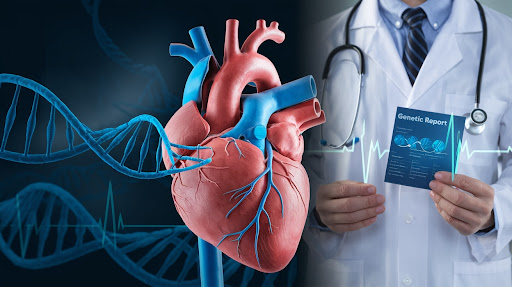Introduction
Heart disease is one of the leading causes of death worldwide, and while lifestyle factors such as diet, exercise, and stress management play a significant role, genetics also has a powerful impact. Family history can influence a person’s risk of developing cardiovascular conditions like high blood pressure, coronary artery disease, and heart attacks. Understanding the role of genetics in heart disease helps people take preventive steps and manage their health more effectively.
How Genetics Influence Heart Health
Genetics refers to the information passed down from parents to children through DNA. Certain gene variations can affect how the body processes cholesterol, regulates blood pressure, or manages clotting, which increases the likelihood of heart problems.
For example:
- Some genetic mutations cause familial hypercholesterolemia, a condition where the body cannot properly remove bad cholesterol (LDL) from the blood.
- Other genes may increase the tendency for high blood pressure, raising the risk of heart failure and stroke.
- Abnormalities in heart structure, such as congenital heart defects, can also be inherited.
Family History and Heart Disease Risk
If one or more close relatives (parents, siblings, or grandparents) had heart disease at an early age, the chances of developing similar conditions are higher. Doctors often ask about family medical history to assess cardiovascular risk.
Key signs that genetics may be influencing heart disease include:
- Heart attack or stroke in a relative before age 55 (men) or 65 (women)
- Multiple family members with high cholesterol or hypertension
- Inherited heart rhythm problems (arrhythmias)
- Congenital heart defects present from birth
Interaction of Genetics and Lifestyle
While genetics can increase risk, lifestyle choices still play a major role. A person may inherit a higher risk of high cholesterol, but unhealthy eating, smoking, and lack of exercise can make the condition worse. On the other hand, healthy habits can lower overall risk even in genetically vulnerable individuals.
Genetic Testing and Screening
Modern medicine offers genetic testing to identify specific mutations linked to heart disease. These tests can:
- Detect conditions like familial hypercholesterolemia early
- Help doctors create personalized treatment plans
- Provide insight into risks for children and future generations
Screening tests such as cholesterol checks, blood pressure monitoring, and echocardiograms are especially important for people with a strong family history of heart disease.
Preventive Measures for Genetically At-Risk Individuals
Even if genes increase the chances of heart disease, proactive steps can make a big difference. These include:
- Maintaining a heart-healthy diet
- Exercising regularly
- Managing stress effectively
- Avoiding smoking and limiting alcohol
- Getting regular check-ups and following doctor’s advice
Conclusion
Genetics play a significant role in determining heart disease risk, but they do not dictate destiny. While inherited factors may predispose someone to heart problems, lifestyle choices and preventive care can reduce the overall risk. By combining medical knowledge, early screening, and healthy habits, individuals with a family history of heart disease can take control of their cardiovascular health and lead long, fulfilling lives.

